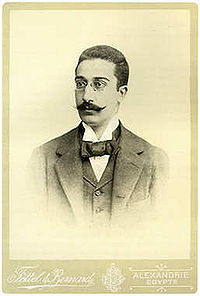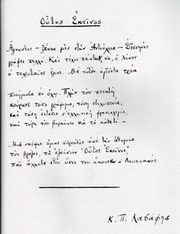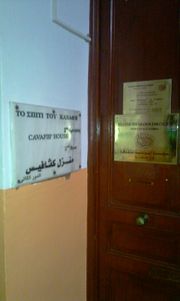Constantine P. Cavafy
| Constantine P. Cavafy | |
|---|---|
 Cavafy, around 1900 in Alexandria, Egypt |
|
| Born | April 29, 1863 Alexandria, Egypt |
| Died | April 29, 1933 (aged 70) Alexandria, Egypt |
| Occupation | Poet, journalist, civil servant |
Constantine P. Cavafy, also known as Konstantin or Konstantinos Petrou Kavafis, or Kavaphes (Greek Κωνσταντίνος Π. Καβάφης) (April 29, 1863 – April 29, 1933) was a renowned Greek poet who lived in Alexandria and worked as a journalist and civil servant. In his poetry he examined critically some aspects of Christianity, patriotism, and homosexuality, though he was not always comfortable with his role as a nonconformist. He published 154 poems; dozens more remained incomplete or in sketch form. His most important poetry was written after his fortieth birthday.
Contents |
Biography
Cavafy was born in 1863 in Alexandria, Egypt, to Greek parents, and was baptized into the Greek Orthodox Church. His father was a prosperous importer-exporter who had lived in England in earlier years and acquired British nationality. After his father died in 1870, Cavafy and his family settled for a while in Liverpool in England. In 1876, his family faced financial problems following the crash, so, by 1877, they had to move back to Alexandria.
In 1882, disturbances in Alexandria caused the family to move again, though temporarily, to Constantinople. This was the year when a revolt broke out in Alexandria against the Anglo-French control of Egypt, thus precipitating the 1882 Anglo-Egyptian War. Alexandria was bombarded by a British fleet and the family apartment at Ramleh was burned.
In 1885, Cavafy returned to Alexandria, where he lived for the rest of his life. His first work was as a journalist; then he took a position with the British-run Egyptian Ministry of Public Works for thirty years. (Egypt was a British protectorate until 1926.) He published his poetry from 1891 to 1904 in the form of broadsheets, and only for his close friends. Any acclaim he was to receive came mainly from within the Greek community of Alexandria. Eventually, in 1903, he was introduced to mainland-Greek literary circles through a favourable review by Xenopoulos. He received little recognition because his style differed markedly from the then-mainstream Greek poetry. It was only 20 years later, after the Greek defeat in the Greco-Turkish War (1919-1922), that a new generation of almost nihilist poets (e.g. Karyotakis) would find inspiration in Cavafy's work.
A biographical note written by Cavafy reads as follows:
- "I am from Constantinople by descent, but I was born in Alexandria—at a house on Seriph Street; I left very young, and spent much of my childhood in England. Subsequently I visited this country as an adult, but for a short period of time. I have also lived in France. During my adolescence I lived over two years in Constantinople. It has been many years since I last visited Greece. My last employment was as a clerk at a government office under the Ministry of Public Works of Egypt. I know English, French, and a little Italian."
It is generally accepted that Cavafy was homosexual[1] and overtly gay themes appear in a large number of his poems.
He died of cancer of the larynx on April 29, 1933, his 70th birthday. Since his death, Cavafy's reputation has grown. He is now considered one of the finest European and modern Greek poets. His poetry is taught at schools in mainland Greece and Cyprus, and across universities around the world.
E.M. Forster knew him personally and wrote a memoir of him, contained in his book Alexandria.
Work


Cavafy was instrumental in the revival and recognition of Greek poetry both at home and abroad. His poems are, typically, concise but intimate evocations of real or literary figures and milieux that have played roles in Greek culture. Uncertainty about the future, sensual pleasures, the moral character and psychology of individuals, homosexuality, and a fatalistic existential nostalgia are some of the defining themes.
Besides his subjects, unconventional for the time, his poems also exhibit a skilled and versatile craftsmanship, which is almost completely lost in translation. Cavafy was a perfectionist, obsessively refining every single line of his poetry. His mature style was a free iambic form, free in the sense that verses rarely rhyme and are usually from 10 to 17 syllables. In his poems, the presence of rhyme usually implies irony.
Cavafy drew his themes from personal experience, along with a deep and wide knowledge of history, especially of the Hellenistic era. Many of his poems are pseudo-historical, or seemingly historical, or accurately, but quirkily, historical.
One of Cavafy's most important works is his 1904 poem "Waiting for the Barbarians". This work, in the person of a disingenuous Byzantine narrator, cynically explores the view that cultivating fear of an invisible external enemy usually serves internal purposes. Parallels have been drawn between the poem's message and the 21st-century war on terror.[2] In 1911, Cavafy wrote Ithaca, inspired by the Homeric return journey of Odysseus to his home island, as depicted in the Odyssey. The poem's theme is that enjoyment of the journey of life, and the increasing maturity of the soul as that journey continues, are all the traveler can ask.
Ithaca
| Original Greek | English Translation |
|---|---|
|
|
Cavafy divides his own work into three categories:
Historical poems
These poems are mainly inspired by the Hellenistic era with Alexandria at primary focus. Other poems originate from Helleno-romaic antiquity and the Byzantine era. Mythological references are also present. The periods chosen are mostly of decline and decadence (e.g. Trojans); his heroes facing the final end.
Sensual poems
The sensual poems are filled with lyricism and emotion; inspired by recollection and remembrance. The past and former actions, sometimes along with the vision for the future underlie the muse of Cavafy in writing these poems.
Philosophical poems
Also called instructive poems they are divided into poems with consultations to poets and poems that deal with other situations such as closure (for example, "The walls"), debt (for example, "Thermopylae"), and human dignity (for example, "The God Abandons Antony").
Museum

Cavafy's Alexandria apartment has since been converted into a museum. The museum holds several of Cavafy's sketches and original manuscripts as well as containing several pictures and portraits of and by Cavafy.
Bibliography
Selections of Cavafy's poems appeared only in pamphlets, privately printed booklets and broadsheets during his lifetime. The first publication in book form was "Ποιήματα" (Poiēmata, "Poems"), published posthumously in Alexandria, 1935.
Volumes with translations of Cavafy's poetry in English include:
- Poems by C. P. Cavafy, translated by John Mavrogordato (London: Chatto & Windus, 1978, first edition in 1951)
- The Complete Poems of Cavafy, translated by Rae Dalven, introduction by W. H. Auden (New York: Harcourt, Brace & World, 1961)
- Passions and Ancient Days - 21 New Poems, Selected and translated by Edmund Keeley and George Savidis (London: The Hogarth Press, 1972)
- Poems by Constantine Cavafy, translated by George Khairallah (Beirut: privately printed, 1979)
- C. P. Cavafy, Collected Poems, translated by Edmund Keeley and Philip Sherrard, edited by George Savidis, Revised edition (Princeton, NJ: Princeton University Press, 1992)
- Selected Poems of C. P. Cavafy, translated by Desmond O'Grady (Dublin: Dedalus, 1998)
- Before Time Could Change Them: The Complete Poems of Constantine P. Cavafy, translated by Theoharis C. Theoharis, foreword by Gore Vidal (New York: Harcourt, 2001)
- Poems by C. P. Cavafy, translated by J.C. Cavafy (Athens: Ikaros, 2003)
- I've Gazed So Much by C. P. Cavafy, translated by George Economou (London: Stop Press, 2003)
- C. P. Cavafy, The Canon, translated by Stratis Haviaras, foreword by Seamus Heaney (Athens: Hermes Publishing, 2004)
- The Collected Poems, translated by Evangelos Sachperoglou, edited by Anthony Hirst and with an introduction by Peter Mackridge (Oxford: Oxford University Press, 2007)
- The Collected Poems of C. P. Cavafy: A New Translation, translated by Aliki Barnstone, Introduction by Gerald Stern (New York: W.W. Norton, 2007)
- C. P. Cavafy, Selected Poems, translated with an introduction by Avi Sharon (Harmondsworth: Penguin, 2008)
- C. P. Cavafy, Collected Poems, translated by Daniel Mendelsohn (New York: Alfred A. Knopf, 2009)
Translations of Cavafy's poems are also included in
- Modern Greek Poetry, edited by Kimon Friar (New York: Simon and Schuster, 1973)
- Memas Kolaitis, Cavafy as I knew him (Santa Barbara, CA: Kolaitis Dictionaries, 1980)
- James Merrill, Collected Poems (New York: Alfred A. Knopf, 2002)
- Derek Mahon, Adaptations (Loughcrew, Ireland: The Gallery Press, 2006)
- A.E. Stallings, Hapax (Evanston, Illinois: Triquarterly Books, 2006)
- John Ash, In the Wake of the Day (Manchester, UK: Carcanet Press, 2010)
A translation of Cavafy's prose is available in
- Selected Prose Works, C.P. Cavafy, edited and translated by Peter Jeffreys (Ann Arbor: University of Michigan Press, 2010)
Other works:
- Robert Liddell, Cavafy: A Critical Biography (London: Duckworth, 1974). A widely acclaimed biography of Cavafy. This biography has also been translated in Greek (Ikaros, 1980) and Spanish (Ediciones Paidos Iberica, 2004).
- Edmund Keeley, Cavafy's Alexandria (Princeton, NJ: Princeton University Press, 1995). An extensive analysis of Cavafy's works.
- Michael Haag, Alexandria: City of Memory (New Haven, CT: Yale University Press, 2005). Provides a portrait of the city during the first half of the twentieth century and a biographical account of Cavafy and his influence on E.M. Forster and Lawrence Durrell.
- Michael Haag, Vintage Alexandria: Photographs of the City 1860-1960 (New York and Cairo, The American University in Cairo Press, 2008). A photographic record of the cosmopolitan city as it was known to Cavafy. It includes photographs of Cavafy, E M Forster, Lawrence Durrell, and people they knew in Alexandria.
Filmography:
- Cavafy, a biographical film was directed by Iannis Smaragdis in 1996 with music by Vangelis. A literary form of the script of the film was also published in book form by Smaragdis.
Other references:
- C. P. Cavafy appears as a character in the Alexandria Quartet of Lawrence Durrell.
- The Weddings Parties Anything song 'The Afternoon Sun' is based on the Cavafy poem of the same title.
- The American poet Mark Doty's book My Alexandria uses the place and imagery of Cavafy to create a comparable contemporary landscape.
- The Canadian poet and singer-songwriter Leonard Cohen memorably transformed Cavafy's poem "The God Abandons Antony," based on Mark Antony's loss of the city of Alexandria and his empire, into "Alexandra Leaving," a song around lost love.[3]
References
- ↑ Woods, Gregory (1999). A History of Gay Literature, the Male Tradition. Yale University Press. ISBN 978-0300080889.
- ↑ "Visions of a World without the War on Terror". http://www.iecah.org/ver_completo.php?id_articulo=286.
- ↑ Alexandra Leaving
External links
- C. P. Cavafy - The official website of the Cavafy Archive (in English)
- "The official website of the Cavafy Archive" (in Greek)
- A comprehensive website, including a biography, a gallery, bibliography, news and extensive selections of poetry in English and Greek
- Cavafy in English and Greek, Select Online Resources
- W. H. Auden's Introduction to Cavafy's poems
- Audio introduction to Cavafy's poems In English, with examination of ten of his finest poems
- The Cavafy Museum in Alexandria
- Cavafy: surviving immortality
- "Artificial Flowers"—translations by Peter J. King & Andrea Christofidou
- Extensive collection of poems, in English & Greek & audio
- Ithaki.net A search engine named in honor of the poem "Ithaki"
- 'As Good as Great Poetry Gets' Daniel Mendelsohn article on Cavafy from The New York Review of Books
- Of the Jews by C. P. Cavafy
- Audio: Cavafy's poem Ithaka read by Edmund Keeley
- "In the dull village", a painting by David Hockney inspired by Cavafy, now in the British Museum